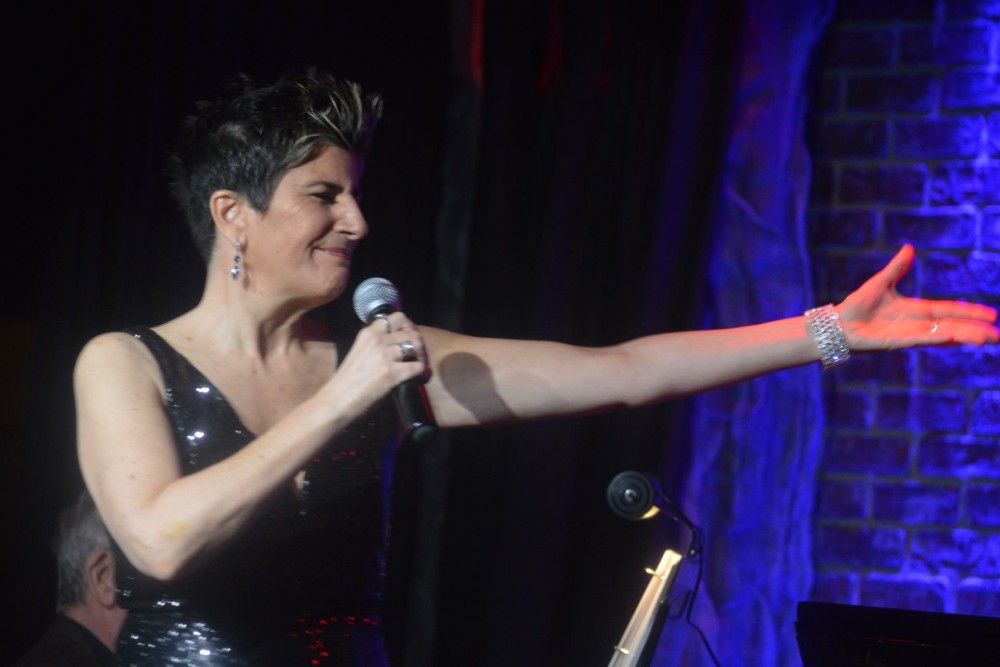By Myra Chanin
Pangea, the sophisticated one-of-a-kind East Village Mecca for cabaret, song and performance since 2015, reminds me of the kind of dimly lighted, classy, Bohemian oasis in which the poet Edna St. Vincent Millay would have been found during the Roaring Twenties. It reeks with chic. Its restaurant-bar kitchen supplies delicious and filling, reasonably-priced Italian-Mediterranean dishes. The intimate 60-seat boîte surrounds a petite raised dais with a blue satin rear curtain, a setting which easily switches tone and mood from a harsh Weimar Republic Kabarett setting to a Warner Brothers World War II romantic dreamland. The Warner Brothers atmosphere suited the stylish and refined Meringolo’s current show promoting her new CD, “Between Yesterday and Tomorrow, The Songs of Alan and Marilyn Bergman,” (on October 27) which contain the words they wrote for tunes originally heard on the silver screen.
The Bergmans are mavens on “how to keep the music playing,” a song which contains wisdom gleaned from their own lives. Imagine still communicating in poetic phrases after being married to only each other – and working together! – for over 60 years! Their collaboration has resulted in many Best Song nominations and three Oscar winners. Two were for best original song in a movie – “Windmills of My Mind,” (1969) with composer Michel Legrand and “The Way We Were” (1974) with Marvin Hamlisch. They received their third Oscar for being on the team responsible for the best original musical score in a film for Yentl (1984) with the music supplied by their most frequent colleague, Michel Legrand.
Meringolo focuses on the Bergmans’ flowing lyrics. She has a powerful but subtle, beautifully trained, smooth and mellow contralto. She utters every note and every syllable cleanly and clearly as if each one counts. And when she sings them, they certainly do. Doyle Newmyer, her musical director of many years, supplies her with lush arrangement which make you want to cuddle up with someone you love. John Marcum is playing bass with Marieann and Doyle for the very first time. You’d never know it. They play like they’ve been working together for years.
Marieann glides toward the stage. Her appearance is elegant, striking. Her trim, beautifully styled hair becomes a helmet atop a slim body in a striking black halter gown – an upside-down exclamation point which demands attention. With a welcoming smile, she sings the first notes of Marvin Hamlisch’s “The Way We Were,” not evasively like Streisand but strong and compelling from start to finish before segueing into a Johnny Mandel’s tune, “Where Do You Start,” which also deals with a Bergman constant – change, before switching to two up-tempo melodies by Lew Spence, the close friend who actually introduced Alan to Marilyn and suggested they try working together — “Nice ‘n’ Easy” which Frank Sinatra, after initially rejecting it, made the title song of his first album for Reprise Records and “That Face,” which Fred Astaire sang to Audrey Hepburn in “Funny Face,” and gave Alan the feeling of enough financial security to propose.
The Bergmans wrote lyrics for other songsmiths as well – Cy Coleman, Quincy Jones, Henry Mancini, which are not included in the CD or this show, but they did include Jazzman Dave Grusin’s not jazzy at all “It Might Be You,” which is reminiscent of a Michel Legrand melody, before Meringolo switches to eight Michel Legrand tunes. The first, “What Are You Doing the Rest of Your Life?” is, was, and will forever be glorious, especially as sung by Ms. Meringolo. The next, “I Was Born in Love with You,” seemed a hokey, lesser Legrand-Bergman effort. It was written for Wuthering Heights and had a properly spooky wooziness. To me, “How Do You Keep the Music Playing?” is another great Legrand-Bergman work of art, but seven in a row is a bit of overkill.
The song that was to me and the audience the high point of both the show and the album and has now been added to every great singer’s repertoire, the striking and unusual “Fifty Percent” originally written for a TV show, Queen of the Stardust Ballroom, and the Broadway musical that followed. In contrast to the Legrand romantica, pieces of sky were never mentioned. The lyrics were very womanly, totally practical, completely down to earth, which made me think they were written entirely by Marilyn Bergman. The original singer is a widow who gets involved with a man who didn’t tell her he was married which the widow accepts. BUT Marieann gives it a very contemporary twist. She becomes a woman singing to another woman who’s married, and the he becomes a she, as follows:
I don’t share her name, I don’t wear her ring,
There’s no piece of paper saying that she’s mine,
But she says she loves me, and I believe it’s true
Doesn’t that make someone belong to you…
And ends with this powerhouse rhyme
When you fall, you fall
I’d rather have fifty percent of her, or any percent of her
Than all of anybody else at all.
Marieann Meringolo gives “Fifty Percent,” 2000% of her feelings and talent. I’d rather listen to her sing that song in that way and other songs of that ilk by a variety of composers that deserve an artist like her’s attention than most of the repetitive Legrand-Bergman better known, more familiar and popular hits, that bunched together reveal their redundancy.



















